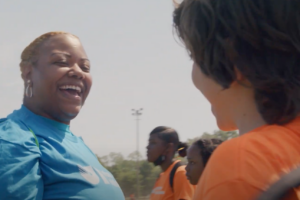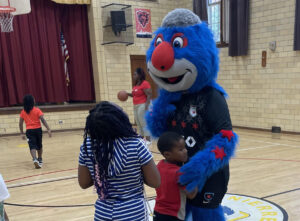 “What is y’all thinking? Why are you doing that? You need to pick that up and do your homework,” the coach snapped. The offenders did their best to look ashamed, each beginning to pick up the crumpled pieces of paper on the ground.
“What is y’all thinking? Why are you doing that? You need to pick that up and do your homework,” the coach snapped. The offenders did their best to look ashamed, each beginning to pick up the crumpled pieces of paper on the ground.
“Hold on, I can handle this,” said another coach. “You guys know what the soccer team is about. You need to do well in school and eat healthy. You know that.” Pointing to a completely shredded assignment, “you probably need a new one,” the coach finished.
The action abruptly stopped, and the circle of kids and adults burst into laughs, cheers and applause. This role play activity capped off Urban Initiatives’ first celebration for our 5th-8th grade players, now officially called mentor-coaches.
“What was good about how these mentor coaches handled this situation?” Coach Tom asked. A flurry of hands, and the mentor coaches in the audience, one by one, talked about the calmness of the second mentor coach, the importance of homework, and the ability to be a role model that was all the more important for them as older coaches.
Each of the groups present had a chance to dramatize a role-playing scenario—a kid who didn’t want to play, confronting bullies, or intervening on unhealthy eating—before the crowd of fellow mentor coaches and Urban Initiatives staff. After each scenario, the group debriefed as a whole on how the examples could make them better mentor-coaches.
These players, representing twelve schools, are too old to officially participate in the Work To Play Program but they want to stay involved, so this role represents a way for them to embody Urban Initiatives’ health and character lessons and be role models for the next generation of players.
In addition to the role-playing, mentor-coaches got to know each other and their roles a little better through a couple of games and activities before they took a lunch break with hummus, Jerusalem salad, and chicken shawerma from Sultan’s Market. After lunch, the mentor-coaches left their school groups and formed mixed groups to discuss their roles as assistants to their teams, and how they could set goals to be better at those roles in the winter session.
At the end of the party, mentor-coaches were presented with limited-edition Chicago Fire shirts and Urban Initiatives backpacks. More than anything, this party sought to secure a special group identity for the mentor-coaches across schools. As they departed, Coach Tom encouraged everyone to wear their special shirts to game days, and to continue to develop their relationships with one another. “Remember,” Coach Tom said, “that even though we’re from different schools, we’re all part of the same Urban Initiatives team.”
Even after the official end, some of the mentor-coaches hadn’t had enough hanging out, and stuck around to chat, kick a soccer ball around the office, and even witness a headstand competition. Seeing these kids work together and be focused in defining and expanding their hopes for the winter season and beyond, it’s certain that the program will benefit from the efforts of these emerging leaders.


